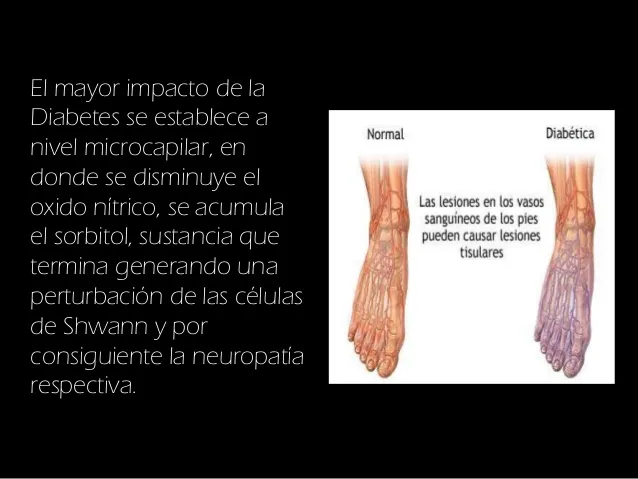It is a nerve damage that occurs in diabetic people.This condition is a complication of diabetes.
Causes
In people with diabetes, nerves in the body can be damaged by a decrease in blood flow and a high blood sugar level.This condition is more likely if the blood sugar level is not well controlled.
Approximately half of the diabetics suffer from neurological damage.Symptoms often do not begin until many years after the diagnosis of diabetes.Some people who have diabetes that develop slowly already have nerves when they are diagnosed for the first time.
Symptoms
Symptoms often appear slowly for many years.The types of symptoms depend on the nerves that are affected.
The nerves on the feet and legs are affected more frequently.The symptoms usually begin on the fingers of the feet and feet, and cover tingling or ardor, or deep pain.Over time, nerves can also occur on the fingers of the hands and hands.As the damage gets worse, you will probably lose sensitivity to the feet and legs.Your skin will also become insensitive.Because of this, you can:
Do not notice when you stop on something pointed.
Not knowing that he has a blister or a small cut.
Do not notice when legs or feet touch something that is too hot or cold.
When the nerves that control digestion are affected, you can have problems digesting food.This can hinder the control of your diabetes.Damage to nerves that control digestion almost always occurs in people with severe neurological damage on their feet and legs.The symptoms of digestive problems cover:
Feel full after eating just a small portion of food
Gastric acidity and distension
Nausea, constipation or diarrhea
Problems to swallow
Vomit food without digesting a few hours after a meal
When there is damage to the nerves in your heart and blood vessels, you can:
Feel dizzy when standing (orthostatic hypotension).
Have a rapid heart rate.
Do not notice angina, chest pain that warns about heart disease and heart attack.
Other symptoms of nervous damage are:
Sexual problems, which can cause difficulties in achieving erections in men and vaginal dryness and problems with orgasm in women.
Do not be able to realize that your glycemia gets too low.
Vesical problems, which causes urine escapes and possibly not being able to empty the bladder.
Swear too much, even when the temperature is fresh, when you are at rest or at other unusual moments.
A lot of sweat on the feet (initial damage) or a lot of dryness (subsequent damage).
Tests and exams
The doctor will carry out a physical exam, in which you can discover that you have the following:
Lack of weak reflexes or reflexes in the ankle.
Loss of feet sensitivity (this is verified with an instrument similar to a brush called a monofilament).
Skin changes, including dry or thick skin or discolored nails.
Loss of the ability to feel the movement of the joints (their own).
Fall in blood pressure when you stand after sitting or lying.
The exams that can be ordered to cover:
Electromyography (EMG): A record of the electrical activity of the muscles.
Nervous driving speed tests (VCN): A speed record at which the signals travel along the nerves.
Study of gastric emptying to verify how fast the food comes out of the stomach and enters the small intestine.
Slipping testTo verify if the nervous system is properly controlling blood pressure.
Treatment
Follow doctors the advice on how to reduce nerve damage to diabetes.
control your sugar level (glucose) in the blood:
Eating healthy foods.
Regular exercise.
Checking your blood sugar with the frequency indicated and keeping a record of your numbers, so that you know the types of food and activities that affect your blood sugar level.
Taking medications or insulin as indicated by the doctor.
To treat neurological damage symptoms, the doctor can prescribe medications for:
Pain on the feet, legs or arms
Nausea, vomiting or other problems with digestion
Bladder problems
Vaginal erection or dryness problems
When you have the nerves on your feet, sensitivity can be reduced in this part.You may not even have sensitivity at all.Consequently, the feet are probably healed if they are injured.Feet care can prevent minor problems from becoming something so serious that you end up in the hospital.
The care of the feet covers:
Check your feet every day.
Ensure that they take an exam of the feet every time you go to the doctor.
Use the correct type of socks and shoes (ask the doctor about this).
Support groups
Many resources can help you understand more about diabetes.You can also learn ways to handle your diabetic neuropathy:
American Diabetes Association: www.diabetes.org
National Diabetes Information Clearinghouse: www.diabetes.niddk.nih.gov
Expectations (prognosis)
Treatment relieves pain and controls some of the symptoms.
Other problems that may arise:
Bladder and kidney infections.
Diabetic foot ulcers.
Neuropathy that hides the symptoms of chest pain (angina) which is a warning of heart disease and heart attack.
Loss of a foot, a foot or a leg through an amputation, usually due to a bone infection that does not healthy.
When to contact a medical professional
Check with the doctor if you have any diabetic neuropathy symptom.
Alternative names
Diabetic neuropathy;Diabetes Neuropathy
References
American Diabetes Association.Standards of Medical Care in Diabetes - 2014. Diabetes Care
Bril V, England J, Franklin GM, et al.EVENCE-BASED GUIDELINE: TREATMENT OF PAINFUL DIABETIC NEUROPATHY: Report of the American Academy of Neurology, The American Association of Neuromuscular and Electrodiagnostic Medicine, and The American Academy of Physical Medicine and Rehabilitation.Neurology
Updated 8/5/2014
English version reviewed by: Brent Wisse, MD, Associate Professor of Medicine, Division of Metabolism, Endocrinology & Amp;Nutrition, University of Washington School of Medicine, Seattle, WA.Also Reviewed by David Zieve, MD, MHA, OGILVIE ISLAND, PHD, AND THE A.D.A.M.Editorial Team.
Translation and location carried out by: Drtango, Inc.

